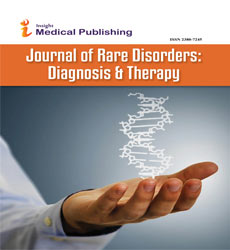Adolescent Health and Well-being in Sickle Cell Disease
Marcos Bezerra
Department of Medicine, Alfaisal University, Riyadh, Saudi Arabia
DOI10.36648/2380-7245.10.1.152
Marcos Bezerra*
Department of Medicine, Alfaisal University, Riyadh, Saudi Arabia
- *Corresponding Author:
- Marcos Bezerra
Department of Medicine,
Alfaisal University, Riyadh, Saudi Arabia,
USA,
E-mail: marcos@gmail.com
Received date: January 30, 2024, Manuscript No. IPRDDT-24-18721; Editor assigned date: February 01, 2024, PreQC No. IPRDDT-24-18721 (PQ); Reviewed date: February 13, 2024, QC No. IPRDDT-24-18721; Revised date: February 19, 2024, Manuscript No. IPRDDT-24-18721 (R); Published date: February 26, 2024, DOI: 10.36648/2380-7245.10.1.151
Citation: Bezerra M (2024) Adolescent Health and Well-being in Sickle Cell Disease. J Rare Disord Diagn Ther Vol.10 No.1:151.
Description
Sickle Cell Disease (SCD) is a group of inherited red blood cell disorders characterized by the presence of abnormal hemoglobin, called hemoglobin S. This condition affects millions of people worldwide, with a significant portion being adolescents. Among them, adolescents with sickle cell anemia and those with sickle cell traits face unique challenges. Understanding these challenges is crucial for providing adequate support and care for this vulnerable population. Sickle cell anemia is the most severe form of sickle cell disease. It occurs when a person inherits two copies of the abnormal hemoglobin gene, one from each parent. Individuals with SCA experience frequent painful episodes, anemia, organ damage, and a shortened lifespan. On the other hand, sickle cell trait occurs when a person inherits one copy of the abnormal hemoglobin gene and one normal hemoglobin gene. While individuals with SCT usually do not experience symptoms, they can pass the trait on to their children. Adolescents with SCA often experience a range of health complications, including acute pain episodes, infections, strokes, and delayed growth. These complications can significantly impact their quality of life and may require frequent hospitalizations and medical interventions. Similarly, while adolescents with SCT may not exhibit symptoms themselves, they may face concerns about the potential health implications for their future children. Living with a chronic illness like SCA can take a toll on adolescents' mental health and well-being.
Academic responsibilities
They may struggle with feelings of isolation, anxiety about their future, and frustration over limitations imposed by their condition. Additionally, they may face stigma or discrimination due to misconceptions about sickle cell disease within their communities. Adolescents with SCT may also experience anxiety or uncertainty about their health status and its implications for their future. Adolescents with SCA may miss school frequently due to illness or hospitalization, leading to academic setbacks and challenges in keeping up with their peers. Additionally, managing their health needs alongside academic responsibilities can be overwhelming. Similarly, adolescents with SCT may need to navigate concerns about participating in certain activities, such as strenuous sports, due to the risk of complications under extreme conditions. As adolescents with SCA transition to adulthood, they face the challenge of transitioning from pediatric to adult healthcare services. This transition can be complex, involving changes in healthcare providers, treatment approaches, and support systems. Ensuring continuity of care and addressing the unique needs of young adults with SCA is essential for optimizing their health outcomes. Similarly, adolescents with SCT may require guidance on managing their health as they transition to independent adulthood. Adolescents with SCA and SCT require access to comprehensive healthcare services that address both their physical and psychosocial needs. This includes regular medical check-ups, pain management strategies, mental health support, and genetic counseling for individuals with SCT and their families. Education and Awareness: Raising awareness about sickle cell disease and sickle cell traits is crucial for reducing stigma, promoting early detection, and empowering adolescents and their families to make informed decisions about their health.
Transition planning
Healthcare providers, community organizations, and the general public to foster understanding and support for individuals with SCA and SCT. Providing psychosocial support services, such as counseling and support groups, can help adolescents with SCA and SCT cope with the emotional challenges associated with their condition. Peer support networks can also offer a sense of belonging and understanding among individuals facing similar experiences. implement accommodations and support services to help adolescents with SCA succeed academically despite their health challenges. This may include flexible scheduling, tutoring services, and communication with healthcare providers to ensure continuity of care. Healthcare providers should develop individualized transition plans for adolescents with SCA as they prepare to enter adult care. This should involve collaboration between pediatric and adult healthcare teams, as well as ongoing support for the adolescent and their family during this critical period of transition. Adolescents with sickle cell anemia and sickle cell traits face a unique set of challenges that can impact their health, well-being, and quality of life. By understanding these challenges and implementing comprehensive support strategies, we can improve outcomes and enhance the overall experience of adolescents living with these conditions. It is essential to prioritize education, awareness, and holistic care to ensure that adolescents with SCA and SCT can thrive despite the challenges they may encounter.
Open Access Journals
- Aquaculture & Veterinary Science
- Chemistry & Chemical Sciences
- Clinical Sciences
- Engineering
- General Science
- Genetics & Molecular Biology
- Health Care & Nursing
- Immunology & Microbiology
- Materials Science
- Mathematics & Physics
- Medical Sciences
- Neurology & Psychiatry
- Oncology & Cancer Science
- Pharmaceutical Sciences
